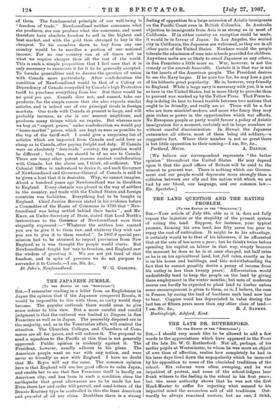THE JAPANESE JUMBLE.
[To THE Emma OV ias "SPECTATOR:I SIR,—I remember reading in a letter from an Englishman in Japan the opinion that if the Japanese conquered Russia, it would be impossible to live with them, so cocky would they become. The popular outbreak there would seem to give some colour to this view. But a more careful and candid judgment is that the outbreak was limited to Jingoes in San Francisco as well as in Japan. The peaceably disposed are in the majority, and, as in the Venezuelan affair, will control the situation. The Churches, Colleges, and Chambers of Com, merce are all for peace, and will enforce it. The proposal to send a squadron to the Pacific at this time is not generally approved. Public opinion is evidently against it. The President, however, usually adheres to his plans. The American people want no war with any nation, and were never so friendly as now with England. I have no doubt that Mr. Bryce will say the same. The common opinion here is that England will use her good offices to calm -Japan, and enable her to see that San Francisco itself is hardly an American city, and has been in such a condition since the earthquake that great allowances are to be made for her. Even there law and order will prevail, and sand-lotters of the Dennis Kearney type be controlled in this the least American and peaceful of all our cities. Doubtless there is a strong feeling of opposition to a large accession of Asiatic immigrants on the Pacific Coast even in British Columbia. In Australia objection to immigrants from Asia is as strong as in most of California. If in either country an exception could be made, it would be in favour of Japan. In Los Angeles, the second city in California, the Japanese are welcomed, as they are in all other parts of the United States. Nowhere would the people tolerate the admission of men into schools provided for children. Anywhere mobs are as likely to assail Japanese as any others, in San Francisco a little more so. War, however, is not the remedy or the amende honorable. Certain it is that war is not in the hearts of the American people. The President desires to see the Navy larger. If he goes too far, be may lose a part of his hitherto great popularity. He is, however, very friendly to England. While a large navy is necessary with you, it is not so here in the United States, but is more likely to provoke than to prevent war, worked up by the Yellow Press. That Press to- day is doing its best to breed trouble between two nations that ought to be friendly, and really are so. There will be a few who are born mischief-makers, and more who fancy they may gain riches or power in the opportunities which war affords. No European people or party would favour a policy of Asiatic immigration for a moment, certainly not in large numbers or without careful discrimination. In Hawaii the Japanese outnumber all others, most of them being old soldiers,—a suggestive fact. Where their number is not so great there is but little opposition to their coming.—I am, Sir, &c., [We believe our correspondent represents "the better opinion" throughout the United States. He may depend upon it that the good offices of Britain will be used to the utmost to prevent war. There is nothing which our Govern- ment and our people would deprecate more strongly than a collision between our ally and the nation with which we are tied by our blood, our language, and our common law.— En. Spectator.]






































 Previous page
Previous page